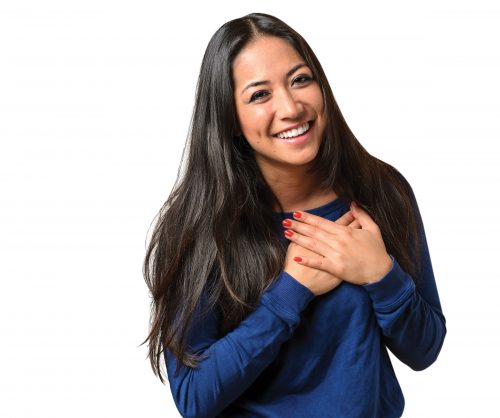
New Zealand-registered nutritionist Nicola Jackson shares 10 tips to build a better relationship with your physical self.
We all know that society, media and advertising promote an unrealistic ‘body ideal’ and we’re encouraged to associate that ‘perfect body’ with the ‘perfect life’. Given how widespread this message is, it’s hardly any wonder many of us struggle with poor body image. And though many of us reject these harmful ideas, it still is really, really hard to say: “You know what? I’m actually fine. I’m tired of feeling horrible about myself. I don’t need to change anything about my body. I just need to look after it, enjoy it andget on with my life.”
Body love is not about looking in the mirror and loving everything you see. It is about accepting the way your body looks today and appreciating all it can do for you. Loving and accepting your body gives you freedom to live a more meaningful life. When you’re not fixated on your body, there’s more time and energy to do the things you love and focus on the things that really matter to you.
In a society obsessed with thinness, it can be a difficult concept to embrace, but focusing on nutrition and physical activity from a view of self-care rather than weight loss is often liberating for those who have been on and off diets and struggled with the way they look.
Here’s how you can get started
1. Stop dieting and allow your body to settle at its natural set point weight
Knowing that changing your body size isn’t as simple as it’s made out to be can be useful in moving towards body acceptance. Research clearly shows that no matter how much weight is lost, for most people, after two to five years, a significant amount, if not all, of the weight is regained. Despite what some believe, this is not a matter of poor self-control. It’s a matter of physiology, as our metabolism slows and hunger hormones increase.
Some feel that giving up on dieting and accepting their body is ‘letting themselves go’, but there is an alternative that most certainly is not. Intuitive eating does not focus on weight loss, but it does focus on self-care and health, with the view that your body weight will settle at its natural set point.
Research shows that those who eat intuitively have improved body satisfaction and self-esteem. Improvements in eating patterns and health behaviours also improve health, even if weight doesn’t change.
2. Appreciate body diversity
When people are unhappy with their body, they’ll often compare themselves with people who are smaller, without actively noticing other body shapes. Noticing the natural diversity in body shapes is a useful exercise in realising that not everyone is in a small body, and that people come in all shapes and sizes.
3. Take a critical view of media
The images we see in magazines and social media are not representative of the body diversity we see in real life. In print media, models and celebrities are airbrushed to remove blemishes, smooth out cellulite, narrow waists and slim legs. Research with teen girls shows that those who take a critical approach to media images are more protected against poor body image, so take note and make a critical appraisal of what you see.
4. Perform a social media cleanse
Create an online environment that supports positive body image by unfollowing all those accounts that make you feel bad about your body. Instead, follow accounts that promote body diversity and fashion for bodies similar to yours.
5. Dress and take care of the body you have today
Instead of wearing clothes that are uncomfortable, or waiting till you lose weight to buy new clothes, dress in a way that makes you feel good as you are today. If you’re holding onto clothes that no longer fit, pack them up and put them away or give them away, because seeing them can trigger negative body thoughts. Paint your nails, soak in the bath, get a massage… do things that make your body feel good.
6. Appreciate what your body allows you to do
We can begin to feel more comfortable with our bodies when we start to appreciate what they do for us rather than what they look like. A useful exercise is to reflect and write down what you’re grateful for experiencing each day and how your body made that possible. For example, I’m grateful for my arms that allow me to hug my children, I’m grateful that my legs allowed me to enjoy a beautiful walk. Reflecting on your body as a vehicle to help you live your life can help you move from a place of body negativity to positivity.
7. Evaluate your values in life
Knowing your values and what’s really important to you can help you focus your attention from your body to where you want to be spending your thoughts and energy. When you’re reaching your twilight years and looking back on your life, what would you wish you’d spent more time doing? If you’re putting a lot of your mental energy and time into thinking about diets, exercise and your body shape, where could you be putting that time and energy instead?
8. Get rid of the scales
The number on the scales has very little meaning, yet it can be a powerful dictator of how someone feels about their body. Loving your body means accepting and caring for it. An activity that causes you to doubt yourself or feel bad about your size is not an act of self-love and will hinder the journey to body love. The same applies to measuring, body checking (eg, pinching fat) and scrutinising your body in the mirror… work towards stopping these behaviours.
9. Start to change your self-talk
When you’re dissatisfied with your appearance, it’s not realistic to look in the mirror and say: ‘I love my body.’ It’s just too far removed from the current reality. What you can do is change critical language to be more neutral. So, instead of saying something like ‘my stomach is big and disgusting’, replace that thought with ‘my stomach is soft and round’. It removes the emotion. Think about how you can be kinder to yourself and aim to talk to yourself the way you would a friend or close family member.
10. Start to separate appearance and self-worth
Our appearance is the least interesting part about ourselves and our lives but, often, our self-worth is deeply rooted in it. It’s time to separate our worth from our appearance. What are your interests? What achievements are you proud of? What do you do well? Remember you are much more than your appearance.
If poor body image is affecting the quality of your life, it’s important to reach out and get help. Your GP can refer you to specialist services available in your area.
www.healthyfood.com










